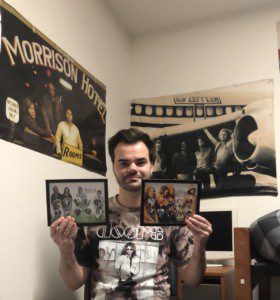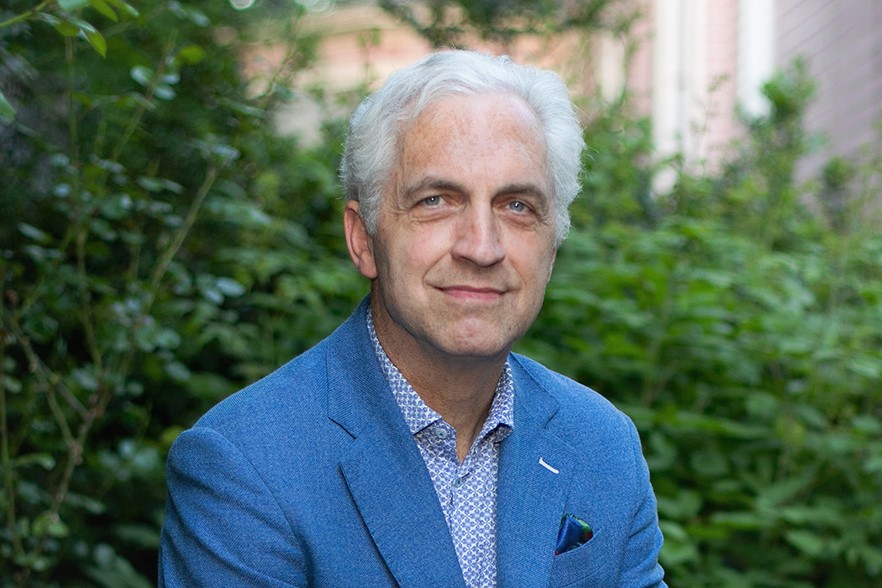Twenty-one-year-old Dennis Cogan’s Zoom background is an array of strikingly-colored band posters from his parents’ generation that cover his dorm room wall. “I wish everyday conversations were like music, where people would be honest about their emotions,” he remarked, pointing to a treasured blow up of Led Zeppelin. He smiled with a calm demeanor and immediately began to open up.

Dennis Cogan, Student at Fordham University and Intern from The Reflect Organization
In high school, Dennis turned to music as if it was “a close friend.” He especially loves rock music – feeling connected with its lyricism and the musicians. “It’s just so open and free flowing. There’s a lot of songs [that express] ‘I’m depressed,’ or, ‘I’m heartbroken.’ But, people won’t say that in everyday conversation. I find it very fascinating how that’s not frowned upon in music, but it’s frowned upon in, you know, everyday conversation,” he said. Music, to Dennis, reminds him that he’s not alone at college. “Everyone experiences the same emotions that I do,” he declared.
Talking about how he feels comes easier to Dennis these days after spending the past summer as an intern at The Reflect Organization, a national mental wellness nonprofit with college and university chapters, dedicated to empowering students to foster a culture of authenticity, self-love, and allyship on campus. Now in his senior year at Fordham University, Dennis is excited to be back on campus after the pandemic hiatus. He’s ready to connect with his peers and showcase what he’s learned from his experiences at Reflect and its founder, Jared Fenton.
“The whole organization was started because when our founder was at UPenn, he noticed that people weren’t being fully truthful about how they were feeling. We all have this motor reaction when people say, ‘Oh, how are you?’ ‘Oh, I’m good.’”
Working as an intern on the Reflect expansion team, Dennis reached out to schools asking if they’d be interested in participating in the program which, among other things, involves ‘Reflect round tables’ where students discuss everything from family issues to deadline stress to COVID-19.
“We might not share the same experiences, but we all experienced the same emotions.”
“We come from so many different walks of life, but we share a lot of the same feelings. We might not share the same experiences, but we all experienced the same emotions,” Dennis said. “The conversations I found the most interesting and valuable led to one shared core – we are all human.”
It is a realization that can be lost when you are in a sea of busy college students all seeming to have it together, as Dennis knows from experience. His struggle with social anxiety and his own transition into college motivated him to help others. “The transition between high school and college is very, very tough. For certain people, like minorities, that’s an added pressure. I’m a White male. I have privilege. For me, it was a tough transition, but for other people, it’s way tougher,” he said.
While he had always been interested in pursuing psychology, it wasn’t until one lecture class that he came to realize his own mental health condition. Dennis shared: “I was taking a class called ‘Abnormal Psychology’ where we were talking about different anxiety disorders. When we got to social anxiety, I remember sitting there thinking, ‘Well, gosh, I check all the boxes. This makes so much sense to me.’ I had to leave the classroom. I went into the bathroom, and I just looked in the mirror feeling like I figured myself out.”
From that point forward, Dennis decided he wanted to get involved in the mental health field. “I didn’t want anyone else to experience what I experienced, but at the same time, I am learning how to combat my own issues. So it was kind of a win-win for me.”
As a psychology and sociology major, Dennis is passionate about eradicating mental health stigma and hopes to expand mental health treatment for men, who are on average less likely to seek help than other genders. He says it can be difficult for men to be open about how they’re doing mentally. “We’ve been raised – programmed – to think that expressing emotion is a sign of weakness, when it’s actually a sign of strength,” he said
While talking about feelings may seem “unmasculine,” Dennis reminds us “it’s how humans operate.”
When asked what advice he would share with new college students struggling to connect, he said taking the initiative to start a conversation can go a long way, even if it’s as simple as ‘Hey, how’s it going? My name’s so and so.’” He is particularly empathetic to sophomores who had a remote freshman year with no real orientation. He reminds students not to be afraid to reach out to each other and says the shared experiences caused by COVID can help. “You can all bond over what you experienced your first year of college virtually and through COVID,” he said.
Regarding using substances to connect with one another, Dennis said, “You don’t need it, not if you can just be yourself.”
Being himself has been a journey for Dennis, and one he hopes others can follow and learn from with organizations like Reflect.
“I think that I am authentic now because I’ve learned to be authentic,” he said.




